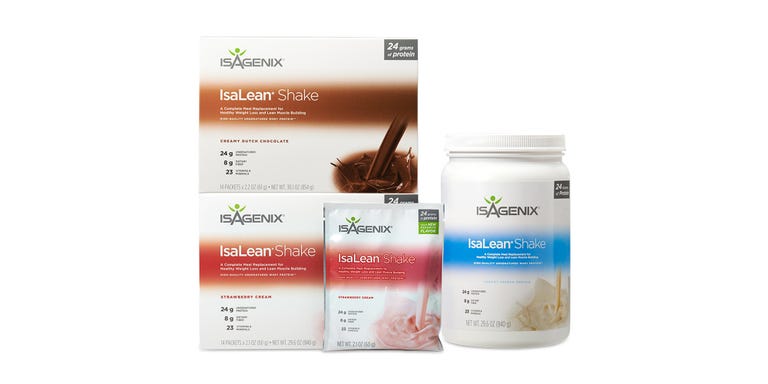
TBH, I thought the whole “cleanses are good for you” thing was over. ICYMI: It’s not.
Case in point: the Isagenix diet, which seems to be popping up on your Facebook newsfeed.
The diet, which includes cleanses, shakes, and supplements, focuses on “nutrition cleansing” and weight loss, says Abbey Sharp, R.D., a Toronto-based dietitian and founder of Abbey’s Kitchen. “They have a variety of cleanses and diet products…that supposedly help you burn fat and naturally detox,” she adds.
But put the brakes on your plans to stock up on shakes and supps galore—there’s more to know about this diet and its products than what Isagenix’s website suggests.
How does the Isagenix diet work?
So, Isagenix has a few different plan options—energy, performance, healthy aging—but for weight loss, they have a system called weight wellness, made up of seven different “pak” or “system” options.
Take the 30-day Isagenix System, for instance (which costs $378.50 a month, BTW). Isagenix says this one’s “ideal for individuals who want to lose weight using a long-term, flexible program.”
Basically, you replace two meals a day with Isagenix shake meals (240 to 280 calories), and, for the third meal, you eat something healthy between 400 and 600 calories. If you get hungry during the day, Isagenix also has small, 100 to 150-calorie snacks.
After a few “shake days,” you’ll have a “cleanse day,” where you’ll be instructed to drink four teeny-tiny servings of a low-cal cleanse liquid and snack on Isagenix Snacks, which are more like a chewable vitamin tablet than a snack.
You take supplements every day too: Ionix Supreme, which you can add to a drink for “clarity and focus,” a Natural Accelerator supplement to help “support a healthy metabolism,” and a pill called Isaflush at bedtime to “support a balanced digestive system.” It’s basically a dose of magnesium and other herbs, which can act like a laxative, says Sharp.
So, can the Isagenix diet help me lose weight?
You bet—just not in a healthy way; like, at all.
“This system advertises that the cleansing helps you lose weight and it will—but all of that weight will likely just be water mass, maybe even muscle, which you definitely don’t want to happen,” says Sharp.
Something else to keep in mind about cleanses: “Our body is really efficient at ‘cleansing’ itself simply by peeing, pooping, sweating, and breathing,” says Sharp.
But the cleanse isn’t the only thing that’s problematic about the Isagenix diet.
“I definitely would never recommend someone be using a laxative, even a natural one, regularly in the long term,” says Sharp. “I also would never suggest someone should eat the same thing—even if it does provide a wide range of nutrients—every single day.” Boring, restrictive diets can be a recipe for disordered eating, she notes.
There may also be some legitimate health concerns with the Isagenix product line. “I am not comfortable with the lack of research on this cocktail of herbs,” says Sharp (she’s talking about the herbs like aloe vera, licorice root, and peppermint in the Isagenix cleanse drink). “Just because they’re natural, doesn’t mean they’re benign, and consumed in large amounts, they may not be safe,” she adds.
A better bet, as per usual: Stick to a healthy mix of real foods for life-long healthy eating and sustainable weight loss. Giving your body a variety of nutritious foods not only promotes overall health, but can also make you feel better.
Variety is key here: “Foods don’t work in isolation,” she says, and “cannot be duplicated through supplements.” And honestly, that sounds so much better than sipping on shakes each day—or cleansing, literally ever.
The bottom line: Skip the Isagenix diet—the cleanses, smoothies, and supplements just aren’t worth it, and won’t result in any kind of sustainable (read: healthy) weight loss
Source: Read Full Article

